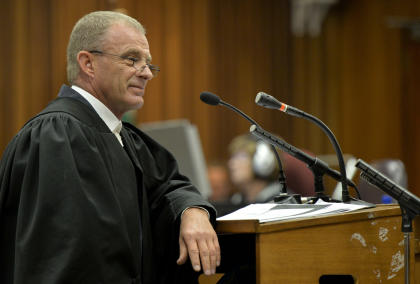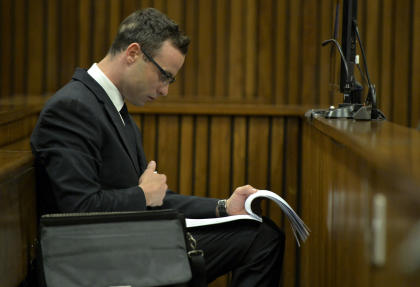Oscar Pistorius Trial Day 37: Prosecution goes after defense's star witness

PRETORIA, South Africa – It was a cross-examination that turned into a standoff.
Professor Wayne Derman, in a neat dark suit and tie on the stand, his right arm outstretched in front of him, his left grasping an imaginary wall.
Prosecutor Gerrie Nel inspected the witness' stance – allegedly a demonstration of Paralympian Oscar Pistorius' movements as he approached the danger he believed lurked at the end of his bathroom passage on Valentine's morning last year.
Derman cocked his head. "Are you happy, sir?" he challenged the prosecutor.
"Mr Derman, the court indicated to you that you should address the court, and not me," Nel retorted.

"Those sarcastic questions is not doing your credibility good," he added, waving his glasses around with a pitying smile. "It does nothing to me."
Embarrassed, the professor looked to the judge for support, only to be met with a stern stare.
"My lady, I'm sorry. It's in response to being asked to show, to demonstrate certain things. I just get the feeling that I'm being on trial here," Derman told Judge Thokozile Masipa.
Nel, also known as the "bull terrier" for his ferocious cross-examinations, was unperturbed, pushing the defense's star witness to seeming frustration.
Derman, a sports doctor who has treated Pistorius for six years, testified in his evidence-in-chief to the Blade Runner's vulnerability, anxiety and fear – a cocktail of factors which he says made the double-amputee's decision to confront apparent danger, rather than flee, a natural one.
The athlete maintains that when he shot and killed his girlfriend Reeva Steenkamp in the early hours of Valentine's Day, he believed her to be an intruder.
Derman's evidence – which included a plethora of studies about primitive human "fight-or-flight" response, and detailed explanations of life with disability – goes to the heart of Pistorius' "putative self defense" strategy.
But despite his compelling initial testimony, the professor appeared ill-prepared for Nel's cross-examination onslaught, becoming combative as the prosecution won admissions on points of critical legal importance.
"I'm not going away," Nel told Derman, as the sports physician looked to the judge for help.
INTENT
Derman's report on Pistorius suggests that a series of auditory "startles" – the initial sound of the bathroom window opening, then the slamming toilet door, and finally the sound of "wood moving" in the cubicle – triggered the "flight-or-fight" reflex in the athlete's subconscious mind.
It could raise issues around the intent with which Pistorius fired his 9mm Taurus, which will ultimately determine if the athlete is found guilty of murder or a lesser charge. But Nel was taking no chances.
"What was the third 'startle?' " Nel prompted Derman.
"The third sound," he replied.
"And what did that cause?" Nel continued.
"That culminated in the shooting," Derman said.
"In the accused firing at the sound?" Nel pressed.
"Must have been, I don't know," Derman said, shrugging.
"You don't know?" Nel raised his eyebrows. "As you stand there, did the accused fire at the sound?"
Pistorius scrutinized Derman from the dock.
"Yes," the professor eventually admitted.
The exchange continued, with Nel seemingly wanting a more definitive response. Eventually, Derman conceded.
"If I put to you that, even on that version, he heard a sound, and he fired at the sound, to kill the person inside the toilet, you cannot say it's not so, am I right?" Nel asked.
Derman sighed. "He fired at the sound, and I'm sure that that was to nullify any threat."
BIAS?
The professor appeared hesitant on the stand during cross-examination, refusing several times to consider hypothetical situations, despite having been presented as an expert witness. An incredulous Nel made the most of it, outrightly accusing the physician of bias towards his patient.
"An expert in his field would be able to do that," he told Derman, "to give the court the benefit of his expertise without being so consumed by the facts."
Questioning whether the professor was presented as a character witness or an expert witness, Nel emphasized his closeness to the athlete.
Derman has traveled with the South African team to two Paralympics – in Beijing and London – admitting to having an "intimate knowledge" of Pistorius, gained from long chats during extensive anti-doping checks for medal winners.
Derman took great offense, insisting all his points were "backed by science."
"I would not risk my reputation," he told the court indignantly.
Attacked by the prosecution for failing to take notes during most of his interviews with Pistorius, Derman remained resolute in his conclusions: "It is my considered view, having regard to my knowledge and experience of Mr. Pistorius and athletes with disability, it is probable that him having perceived auditory stimuli resulted in a significant startle and 'fight-or-flight' response. He approaches the perceived danger. Further sounds resulted in further startle responses and exaggerated fight response, which culminated in this horrific tragedy," he read from his report.
FIGHT OR FLIGHT
The defense's focus on "fight or flight" is a challenge to the state's insistence that Pistorius' actions in approaching the perceived danger are improbable and make no sense.
Defense advocate Kenny Oldwadge hammered the point.
"Why not flee at that particular time?" he asked Derman.
"In this context, my lady, fleeing is not an option," the professor said. "This individual has no lower legs, so to flee is not an option. And if one finds oneself without the ability to flee, the other option is to fight. So to approach the danger in this context is an understandable physiological phenomenon."
Citing studies that anxious people have less control over their "fight-or-flight" reaction, Derman repeatedly explained that it is a "primitive reflex."
"It is my view that a convergence of factors and their ultimate effect needs to be considered," he told the court.
Oldwadge took the professor through a comprehensive list, including Pistorius' anxiety and agoraphobia – a fear of public places, documented in the independent psychologist's report – his "profound fear of crime," being an athlete and trained to be "hyper vigilant" to noises like a starter's gun, the "accentuated startle reflex" in the dark, and the star athlete's 100-plus flights a year, which led him to feel trapped and even more anxious.
But while the triggered reflex may have caused Pistorius to approach the danger, the defense appears to be arguing that it is the double-amputee's hidden vulnerability that caused his fear.
THE TWO OSCARS
"Although he has dedicated his life to being … and he loathes to be pitied in any way, the hard truth is that he does not have lower legs," Derman told the court.

"Mr Pistorius without prostheses represents a different person from a physical, functional and psychological perspective, compared to him with the benefit of his prostheses," he said.
In the dock, Pistorius stared at the ground.
"On the one end, we've got an individual who in able-bodied competition constitutes one of the 18 fastest people in the world, and is 1.84 meters tall, and is pictured with arms up crossing the finish line.
"On the other end of the spectrum, we see an individual who is significantly disabled. He does not have lower legs. He has stumps, and he has stumps which are problematic, and he is 1.5 meters tall."
Pistorius never raised his eyes.
"So you've got a paradox, of an individual who is supremely able, and you've got an individual who is significantly disabled," Derman concluded, adding that the contrast causes Pistorius a "significant amount of stress and anxiety."
The psychological report compiled by Dr. Jonathan Scholtz during his 30-day mental health evaluation makes similar observations, describing "two Oscars" who "gelled into a final split": one, the international superstar, the other "being a vulnerable and fearful disabled person. … That part of him falling back onto his anxiety and fear, not feeling in control."
It quotes Pistorius: "I am stuffed without my legs on."
"For this reason he acquired a weapon," it reads.
VULNERABILITY FROM DISABILITY
Derman believes Pistorius has a "lifetime of real and learnt vulnerability" as a result of his disability.
"We don't understand," he told the court, "we don't have lived experience of disability."
"Disability never sleeps; it's there when you go to sleep at night and it's there when you wake up in the morning," Derman testified, reading a long list of detailed difficulties suffered by amputees, ranging from public judgment, to problems at airport security, embarrassing odors from prosthetic limbs, practical concerns in the shower and with physical intimacy.
It is a compelling argument for viewing Pistorius' decision-making context on Feb. 14 as different from that of an able-bodied person.
But while other disabled activists may agree, they also have serious concerns.
"I feel we are all being tainted with the same brush of vulnerability," Ari Seirlis, chief executive of the lobby and disabled advocacy group, QuadPara Association of South Africa, told Yahoo Sports.
"There are different levels of disability, and how you react is based on your agility," he said. "You can't hold up gold medals in one hand and a pistol in the other and cry that you're vulnerable."
While Seirlis agrees that many disabled individuals may try to play down their disability in public, and that many may feel more concerned about home security than able-bodied adults, he insists few have guns.
Although he may feel more vulnerable on his stumps, Pistorius has also behaved irresponsibly with weapons while wearing his prostheses, Seirlis noted, describing the defense's use of vulnerability as an argument as a "selective excuse."
"We don't want people to think the whole disabled community is vulnerable. We're already a disadvantaged community," he said.
"His vulnerability, it's more a state of mind than a disability," Seirlis said.
The trial will resume on July 7 with Derman's continued cross-examination, after Judge Masipa granted a brief postponement for Nel to consult with the state psychiatrist from the expert panel who conducted Pistorius' 30-day mental health evaluation.
